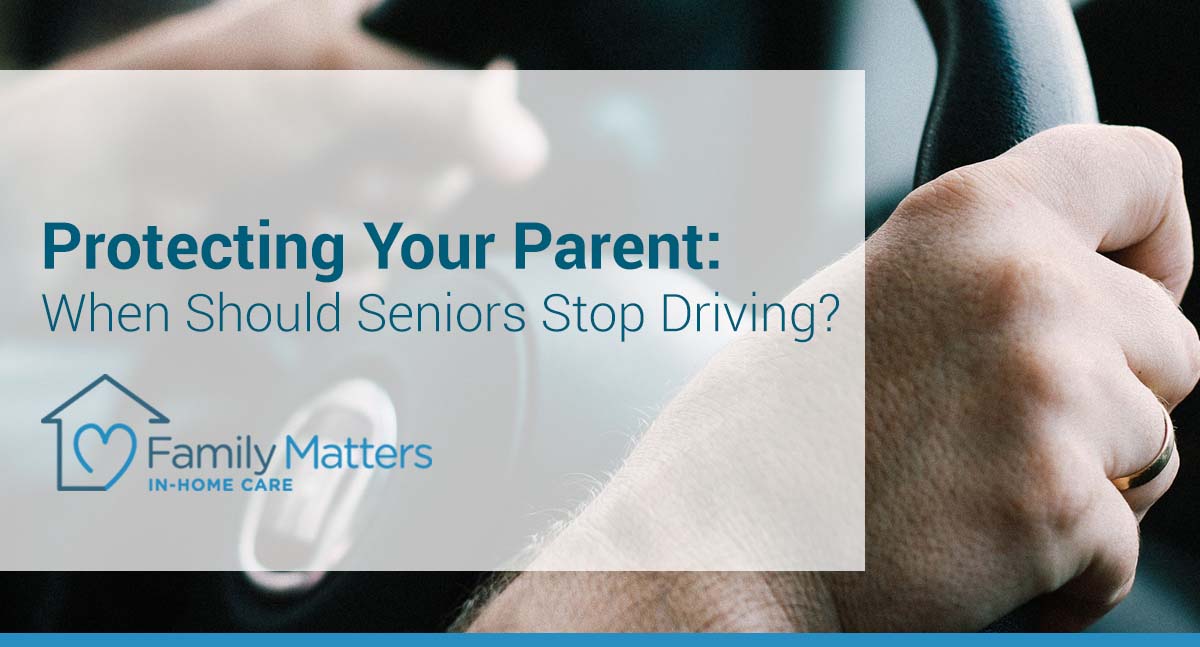
Protecting Your Parent: When Should Seniors Stop Driving?
As seniors age, they may lose the ability to drive safely. According to the CDC, the rate of fatal accidents significantly increases after a driver has reached the age of 70. While many older adults are able to continue driving safely long into their senior years, it’s important to pay attention to any warning signs that age is affecting your parent’s driving skills and make appropriate adjustments.
Warning Signs to Look For
Perhaps you have noticed new scrapes or dents on your parent’s car. Or, maybe there are tire marks along their driveway that suggest they are having trouble pulling in and backing out. If you suspect that your loved one’s driving abilities have changed, ride along in the car with them and observe if they are having trouble following safe driving practices, such as checking their blind spot before changing lanes.
Here is a complete list from AARP of 10 signs that indicate it might be time for your parent to limit or stop driving:
- Almost crashing, with frequent close calls.
- Finding dents or scrapes on the car, or fences, mailboxes and garage doors at
- Getting lost, especially in familiar locations.
- Having trouble following traffic signals, road signs and pavement markings.
- Responding more slowly to unexpected situations, or having trouble moving foot -from gas to brake pedals, confusing the two pedals.
- Misjudging gaps in traffic at intersections and on highway entrance and exit ramps.
- Experiencing road rage or causing other drivers to honk or complain.
- Easily becoming distracted or having difficulty concentrating while driving.
- Having a hard time turning around to check the rear view while backing up or changing lanes.
- Receiving multiple traffic tickets or warnings from law enforcement officers.
Protecting Your Parent
If you notice any of the red flags from the list above, there are some steps you can take to further evaluate your parent’s ability to drive and help ensure their safety.
- Schedule an appointment with the doctor – Talking with your parent’s physician might expose an undiagnosed physical condition or side effects from medication that are impacting their ability to safely operate a vehicle. A doctor can also refer your parent to a certified driver rehabilitation specialist who can provide a comprehensive evaluation of necessary driving skills and recommend tools to keep your parent driving as long as possible. These services are typically covered by insurance.
- Enroll in a driver safety course – You might want to register your loved one for a driver-improvement course to make sure they know the most up-to-date driving techniques and understand the latest vehicle technologies. Courses are offered both in a classroom setting and online by AAA and AARP Driver Safety.
- Take the keys – If your loved one absolutely refuses to stop driving even though it has been determined to be unsafe, you may be forced to intervene. While it might be difficult to take drastic action such as taking their keys or reporting them to the DMV, remember that their safety and the safety of others must come first.
Understandably, driver safety is often a sensitive issue for seniors. Driving allows seniors to feel independent and being denied the ability to drive can be a humiliating reminder that they are becoming less self-sufficient. Still, safety takes priority, and if you have concerns regarding their ability to drive, it’s time to talk to them about it. It may not be an easy conversation to have, but it could save your parent from an accident. Caring.com offers some great tips in an article called “How to Talk to Elderly Adults About Giving up the Keys.”
Additionally, it’s important to remember that although your loved one is no longer able to drive, they will still need to get around. Getting out in the community is an important way to avoid poor health associated with social isolation and loneliness. You may need to help your parent by regularly driving them places yourself, or arranging other transportation services.
Enlisting home care services can be helpful. As part of an overall care plan, an in-home caregiver can safely drive your loved one to and from appointments and social activities. For more information or to schedule a free consultation, contact Family Matters In-Home Care to see how we can help support your family.
